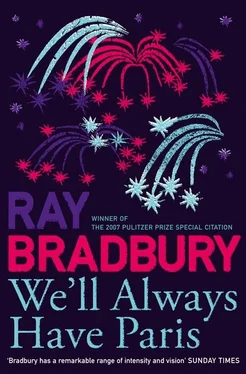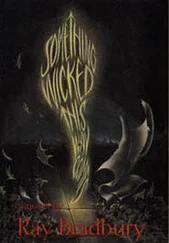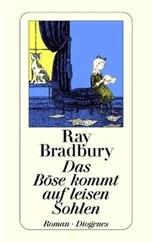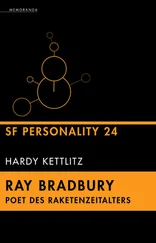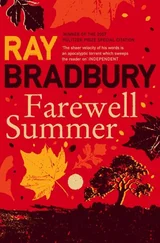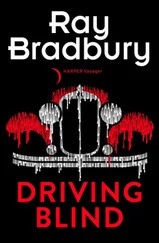‘I don’t want them back!’ Bentley retreated to the doorway.
‘Take them.’
‘You win!’
‘A bet is a bet. This proves nothing.’
He turned and came to Bentley and dropped them in Bentley’s shirt pocket and patted them. Bentley took two steps back into the hall. ‘I do not make bets idly,’ Hill said.
Bentley stared at those terrible scars. ‘How many other people have you made this bet with!’ he cried. ‘How many?!’
Hill laughed. ‘Ham and eggs, eh?’
‘How many?! How many?!’
‘See you at breakfast,’ said Mr Hill.
He shut the door. Mr Bentley stood looking at it. He could see the scars through the door, as if by some translucency of the eye and mind. The razor scars. The knife scars. They hung in the paneling, like knots in old wood.
The light went out behind the door.
He stood over the body and he heard the house waking up, rushing, the feet down the stairs, the shouts, the half screams and stirrings. In a moment, people would be flooding around him. In a moment, there’d be a siren and a flashing red light, the car doors slamming, the snap of manacles to the fleshy wrists, the questions, the peering into his white, bewildered face. But now he only stood over the body, fumbling. The gun had fallen into the deep, good-smelling night grass. The air was still charged with electricity but the storm was passing, and he was beginning to notice things again. And there was his right hand, all by itself, fumbling about like a blind mole, digging, digging senselessly at his shirt pocket until it found what it wanted. And he felt his gross weight bend, stoop, almost fall, as he almost rushed down over the body. His blind hand went out and closed the up-staring eyes of Mr Hill, and on each wrinkled, cooling eyelid put a shiny new dime.
The door slammed behind him. Hattie screamed.
He turned to her with a sick smile. ‘I just lost a bet,’ he heard himself say.
The night was cold and there was a slight wind which had begun to rise around two in the morning.
The leaves in all the trees outside began to tremble.
By three o’clock the wind was constant and murmuring outside the window.
She was the first to open her eyes.
And then, for some imperceptible reason, he stirred in his half sleep.
‘You awake?’ he said.
‘Yes,’ she said. ‘There was a sound, something called.’
He half raised his head.
A long way off there was a soft wailing.
‘Hear that?’ she asked.
‘What?’
‘Something’s crying.’
‘Something?’ he said.
‘Someone,’ she said. ‘It sounds like a ghost.’
‘My God, what a thing. What time is it?’
‘Three in the morning. That terrible hour.’
‘Terrible?’ he said.
‘You know Dr Meade told us at the hospital that that’s the one hour when people just give up, they don’t keep trying anymore. That’s when they die. Three in the morning.’
‘I’d rather not think about that,’ he said.
The sound from outside the house grew louder.
‘There it is again,’ she said. ‘That sounds like a ghost.’
‘Oh my God,’ he whispered. ‘What kind of ghost?’
‘A baby,’ she said. ‘A baby crying.’
‘Since when do babies have ghosts? Have we known any babies recently that died?’ He made a soft sound of laughter.
‘No,’ she said, and shook her head back and forth. ‘But maybe it’s not the ghost of a baby that died, but … I don’t know. Listen.’
He listened and the crying came again, a long way off.
‘What if—’ she said.
‘Yes?’
‘What if it’s the ghost of a child—’
‘Go on,’ he said.
‘That hasn’t been born yet.’
‘Are there such ghosts? And can they make sounds? My God, why do I say that? What a strange thing to say.’
‘The ghost of a baby that hasn’t been born yet.’
‘How can it have a voice?’ he said.
‘Maybe it’s not dead, but just wants to live,’ she said. ‘It’s so far off, so sad. How can we answer it?’
They both listened and the quiet cry continued and the wind wailed outside the window.
Listening, tears came into her eyes and, listening, the same thing happened to him.
‘I can’t stand this,’ he said. ‘I’m going to get up and get something to eat.’
‘No, no,’ she said, and took his hand and held it. ‘Be very quiet and listen. Maybe we’ll get answers.’
He lay back and held her hand and tried to shut his eyes, but could not.
They both lay in bed and the wind continued murmuring, and the leaves shook outside the window.
A long way off, a great distance off, the sound of weeping went on and on.
‘Who could that be?’ she said. ‘ What could that be? It won’t stop. It makes me so sad. Is it asking to be let in?’
‘Let in?’ he said.
‘To live. It’s not dead, it’s never lived, but it wants to live. Do you think—’ She hesitated.
‘What?’
‘Oh my God,’ she said. ‘Do you think the way we talked a month ago …?’
‘What talk was that?’ he said.
‘About the future. About our not having a family. No family. No children .’
‘I don’t remember,’ he said.
‘Try to,’ she said. ‘We promised each other no family, no children.’ She hesitated and then added, ‘No babies.’
‘No children. No babies?’
‘Do you think—’ She raised her head and listened to the crying outside the window, far away, through the trees, across the country. ‘Can it be that—’
‘What?’ he said.
‘I think,’ she said, ‘that I know a way to stop that crying.’
He waited for her to continue.
‘I think that maybe—’
‘What?’ he said.
‘Maybe you should come over on this side of the bed.’
‘Are you asking me over?’
‘I am, yes, please, come over.’
He turned and looked at her and finally rolled completely over toward her. A long way off the town clock struck three-fifteen, then three-thirty, then three forty-five, then four o’clock.
Then they both lay, listening.
‘Do you hear?’ she said.
‘I’m listening.’
‘The crying.’
‘It’s stopped,’ he said.
‘Yes. That ghost, that child, that baby, that crying, thank God it stopped.’
He held her hand, turned his face toward her, and said, ‘We stopped it.’
‘We did,’ she said. ‘Oh yes, thank God, we stopped it.’
The night was very quiet. The wind began to die. The leaves on the trees outside stopped trembling.
And they lay in the night, hand in hand, listening to the silence, the wonderful silence, and waited for the dawn.
It was a hot Saturday night in July in Paris, near midnight, when I prepared to head out and walk around the city, my favorite pastime, starting at Notre Dame and ending, sometimes, at the Eiffel Tower.
My wife had gone to bed at nine o’clock and as I stood by the door she said, ‘No matter how late, bring back some pizza.’
‘One pizza coming up,’ I said, and stepped out into the hall.
I walked from the hotel across the river and along to Notre Dame and then stopped in at the Shakespeare Bookstore and headed back along the Boul Miche to stop at Les Deux Magots, the outdoor café where Hemingway, more than a generation ago, had regaled his friends with Pernod, grappa, and Africa.
I sat there for a while watching the Parisians, of which there was a multitude, had myself a Pernod and a beer, and then headed back toward the river.
The street leading away from Les Deux Magots was no more than an alley lined with antiques stores and art galleries.
Читать дальше
